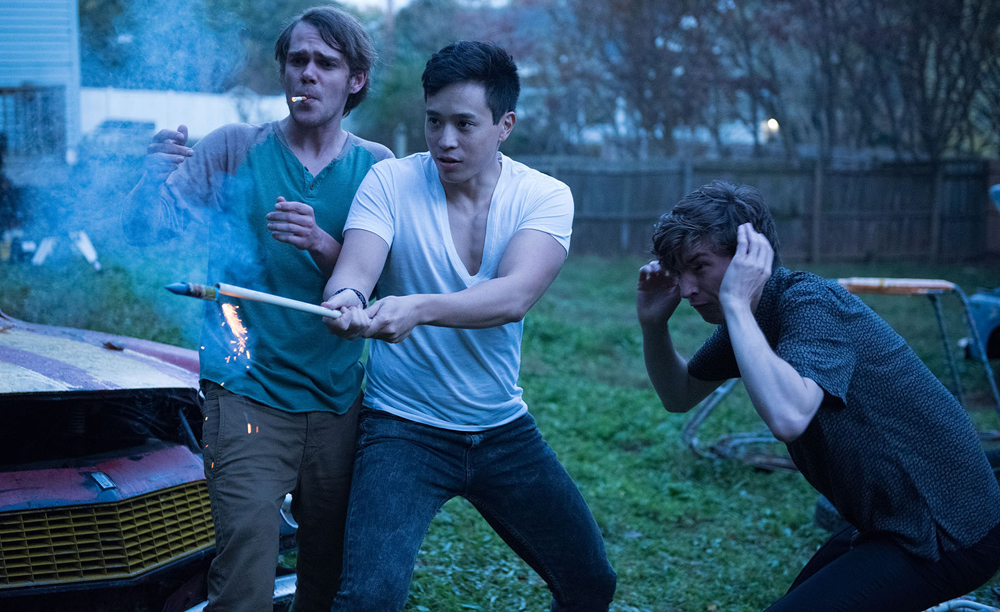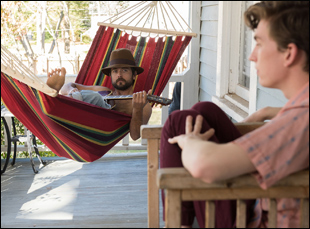Joseph Cross knew a good opportunity when he saw one while making “Summer Night.” The film’s screenwriter Jordan Jolliff had written a tense encounter between Mel (Analeigh Tipton) and Seth (Ian Nelson), one of the many romantic couplings caught at a precarious time in Cross’ directorial debut, and after learning they have a baby on the way, Seth can’t resist checking his cell phone even it’s clear all his attention should be on Mel. Being a movie buff only slightly longer than he began acting in them as a child, Cross’ mind went to Sergio Leone.
“All that happened in the script was his phone [made the] ding [sound] and he picks it up and she says, “What are you doing?” [since it’s such a fraught moment]. And I couldn’t help myself – [I thought] this is my spaghetti western moment, so I’m either going to take it or let it pass me by,” says Cross, who frames a close-up of Tipton’s aggravated eyes as if she were Clint Eastwood sizing someone up before reaching for his gun in “The Good, the Bad and the Ugly.”
Cross faced a standoff of his own in the editing suite when editor Raymond Wood thought about taking the scene out, unsure of whether it would veer too much away stylistically from the rest of the film, but Cross insisted, “‘Just wait until we’re in an audience. I think in a theater it’s going to work.’ [When] we cut back to Analeigh’s eyes, you just get this big laugh because everybody knows that feeling.”
Sure enough, it’s a reference that feels emotionally authentic as it does cinematically acute, something that Cross achieves time and again in “Summer Night,” which finds a frenzied evening of fun in the small town of Newnan, Georgia where all that’s standing in the way of a handful of twenty somethings and their futures is their unresolved relationship status with each other. As a result, there’s as much dancing various issues the couples may have going on before the concert they attend on the big night as when they file inside the Alamo Theater for one last show as one local band after another rocks out and the conversations are even more charged.
Jolliff’s sharp script pinpoints the moment in these characters’ lives where they care too little and too much about where their lives are heading, leading all of them to withhold from those closest to them, whether it’s Seth not telling his best friend Jameson (Ellar Coltrane) about what’s going on with Mel or Jameson attempting to sidestep any talk about the woman running the door at the Alamo (Elena Kampouris) while on a date with Harmony (Victoria Justice), with whom he’s otherwise connecting with, and although Mel’s bestie Lexi (Lana Condor) is forthright with Jack (Bill Milner), who’s long had a crush on her, about hooking up with someone at her sister’s wedding, a conversation about where they can go from here is one they save for the end of the night. Incidentally, it’s the strangers Taylor (Callan McAulliffe) and Dana (Ella Hunt) who open up to each other the most, without fear of upsetting any relationship they’ve built before, that can enjoy each other’s company the most.
The actors bring great energy to film, as does Cross, who complements the zippy banter with high-spirited camerawork and a general joie de vivre that gives an audience the same sense of elation that no doubt his cast did in running wild, and while the first-time director is making his feature debut at an age that most others would, he brings to bear the experience of being on the sets of M. Night Shyamalan (“Wide Awake”), Ryan Murphy (“Running with Scissors”), Gus Van Sant (“Milk”) and even Eastwood (“Flags of Our Fathers”). As he recently discussed on the eve of “Summer Night”’s release in theaters, it was a mix of knowledge and naivete that led to such a lively film.
I had been working on something I was writing that wasn’t really working out and then a friend of mine was working on a movie called “The Circle” with James Ponsoldt and she had become friends with James’ writing assistant Jordan Jolliff, so our mutual friend Lucas Evans, who’s an EP on “Summer Night,” said “Why don’t you send your script to Jordan and see if he can help you out?” Jordan was really gracious and gave my script probably more time than it deserved and I said, “Do you have anything you want me to read, send it on over.” And he sent over “Summer Night” and I was immediately like, “Yeah, I think you have something really special here.” We got on really well and eventually, I thought I’d like to direct this.” Jordan was cool with it and we reached back out to James Ponsoldt who said he’d lend his weight as an executive producer and then once those pieces fell into place, we were able to get started on it.
How did you go about casting? I understand you actually did research online instead of going through a casting director.
Yeah, which I really liked. This is my world, so I know a lot of actors already and I know a lot of people’s work. I’m always watching movies and shows, so I just sort of scoured the internet for people that give me the right feeling in my gut and then I’d reach out to their teams. Thankfully, it was a script that a lot of people responded well to with characters that a lot of people wanted to play, so it made it easier when you could reach out to people and they were all saying yes and getting really excited to come and do this movie. When people decide to do a smaller movie, there’s everything that comes along with that, but everybody was really, really passionate and there were some people I knew peripherally, some were new to me and some I had found on my own – some agents and managers approaching me and we just kept it really simple.
Justin Chatwin was somebody I had known since our early twenties and Analeigh [Tipton] I had met once or twice through friends [and for actors I didn’t know] I had no interest in putting four dozen actors through the ringer just so I can sit there and play director. I’m not wasting anybody’s time, so I’m checking out everybody’s material way before they make a tape, and the auditions for this were super limited. If somebody was auditioning for this, usually they were the only person auditioning and they got the part. [I’d just ask], “I haven’t seen them do comedy yet. Can you just put this one scene on tape and tell them to find the comedy in it and have fun and play with it?” And then you’d get it and say, “Okay, good. They’re going to be able to do this, let’s make it happen.”
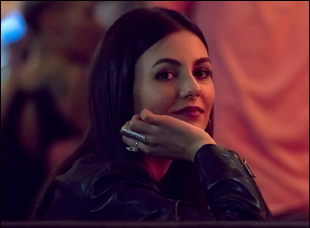
Yeah, working with actors comes as second nature to me at this point because I’ve been doing it for so long, so we had fun on set. I can feel it in my gut when something’s working and some of these actors are really inspired people, so there was a lot of communication. We’re not wasting time on set talking about backstory or anything like that. We had phone calls and meetings leading up to the shoot for that, but I was always rewriting the script when I would cast somebody else – and [just to make clear] this is Jordan Jolliff’s baby, but some scenes we got on set and you realized something’s maybe better said with a look or with a sigh than with a line and any time you can let the actor really shine and do the heavy lifting for you, I’m always game for that, so it’s constantly in flux. You’re molding and shaping it every day all the way through the edit.
You create real energy with the camerawork as well. Are those sweeping pans something that are tricky to pull off?
Yeah, we wanted it to feel like a studio movie, like back when Universal would make these one-night-only coming-of-age films that had this excitement. I knew that building in some energetic camerawork was really integral to that, so thankfully I found this perfect partner-in-crime for me, Michael Fitzmaurice and anything I could come up with, he was making it cooler. So there was a lot of prep on that stuff, knowing what you want way in advance and working with your locations manager and production designer to make sure that you can get everything that you want. Thankfully, we just had a really great team and we never wasted a minute of time on set and we got to pull off some pretty cool stuff.
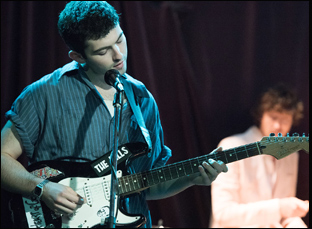
It was pretty baked into the script. It just became much bigger thing once we put it on its feet, but we knew the music would be a driving force of the movie. We just didn’t know how much of a part it would play once we had all those bands in there and then once we were building out the soundtrack, but it’s the heart and soul of the film. We had two great music supervisors – Rob Lowry and Rylan Soref – and we were building the soundtrack together for a really long time, so you’re weaving all these songs that you know you like for the soundtrack. The Whitney album, “Light Upon the Lake” was my north star in making this movie, so I always knew I wanted to end the movie with that, and then I went through, listening to all different bands with all different sounds and these bands were from Athens, Georgia and from Nashville. so similar to casting, you find a band you love, you find songs of theirs that fit the movie tonally and emotionally and hopefully the bands are available [to be n the film]. In our case, they were and we booked them and they came in and did a great job.
Did you have the concert simultaneous with shooting? There’s a scene where Justin Chatwin’s character, a townie, mimics a song that just played, but filming a concert live while you’re trying to get a dramatic scene seems like a handful.
Everybody was there the whole time when we were shooting the concert stuff, so everybody was able to see the show, and sometimes if we didn’t need the bands on stage, we’d just do playback through the speakers in the venue. But everybody had seen the show and were able to react to it, and when we were shooting Justin specifically, I don’t remember if we were shooting the stage at the same time or not, but he had been there for the whole thing. Justin’s just really, really funny in the movie and he brought something really special to it, so whenever I could get an excuse to cut away to him, I would. I had really, really talented actors, so a lot of it was just about giving them the space to do their thing and letting them feel empowered to bring whatever they wanted to the parts.
And you could shape performances in the edit, which must’ve been a part of the process you’re usually not a part of. What was it like having that kind of control?
Yeah, I had no idea how much I was going to love being in the editing room. A big part of that is my editor Raymond Wood, being similar to Michael Fitzmaurice, in that they’re just down to try anything and they’re going to do what they can to make it work. If they can’t, then we all will figure out a way and there were some scenes that were real puzzles that took a lot of figuring out, things that I could’ve addressed better before we shot, so you think how are we going to go in and improve upon this. And being in the edit is great because you feel like you have all the time in the world, even though we only had seven weeks to cut the movie. Unlike being on set, you can go to the bathroom if you need to. [laughs] So it’s unique to the moviemaking experience.
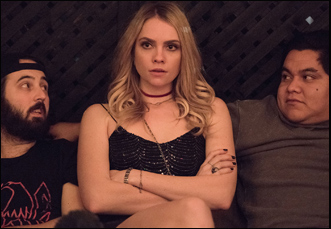
Well, I’m not sure if I ever actually sat down. [laughs] But I spent a lot of time on sets, so I knew when things were working and when things weren’t. And I watched how directors got really great performances out of actors and I watched some people struggle a little bit, so that stuff came to me pretty easily. I understood set language obviously and the politics of a set and the pace and all that. It was how to build a real robust game plan for how you were going to execute this movie and then putting it together afterwards that I had to do a lot of research on, deciding like, “Okay, what is the style of this movie? What do I need the audience to feel in this moment? How can I distill that feeling best with the camera work and with the lighting? And then what’s the plan to enhance it with the sound design? What’s the soundtrack going to be like?” Our movie is mostly source music, so it’s almost all what the characters themselves are listening to in the narrative.
It came out so well – what’s it been like traveling with the film and getting it out there?
It’s been a blast. We couldn’t afford to test screen this movie, so the feedback I was getting was like four or five people we could cram into the edit [suite] and then the only times I had seen it in the theater were a friends and family screening in L.A. before we sold the movie, so that was great, but it was people who were very intimate with the film, so they knew what it was and then the next screening after that was my buyers screening, which is very different than a festival screening, let me just tell you from a filmmaker perspective. I’m listening for every pencil scratch on a clipboard. [laughs] So was that bit of tension through it, this unspoken [feeling in the air of] “Are we going to sell this thing? Are people going to want to watch it?” [But once] you know your film has already sold and it’s going to have a life, it’s just such a joy to be in an audience with people who have no idea what they’re going to watch and experiencing them enjoy the film. I’m really, really appreciative of the festivalgoers and the audience that’s turned out as well as the festivals themselves and the journalists who are writing about it. It means a lot to us. It’s been a labor of love.
“Summer Night” opens on July 12th in Los Angeles at the Arena Cinelounge and New York at the Cinema Village and on iTunes.




